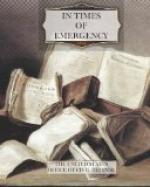* * * * *
CHAPTER 2
UNDERSTAND THE HAZARDS OF NUCLEAR ATTACK
SUMMARY
1. The main hazards of a nuclear attack are blast, heat, fire, and fallout radiation.
2. You may be able to protect yourself
against blast and heat by getting inside a shelter
or taking cover, before the nuclear explosions
occur. You may be able to avoid fire
injuries by putting out small
fires or escaping from large fires that might occur
in your area.
3. You can protect yourself against fallout radiation by getting inside a fallout shelter—if possible, before fallout particles begin drifting down—and by staying there until you are told to come out by authorities who have the equipment to measure radiation levels.
4. After a nuclear attack, food and water would
be available to most people, and it would be usable.
If any fallout particles have collected,
they could be removed before the
food is eaten or the water is
drunk. People suffering from extreme hunger or
thirst should not be denied food or water, even
if the available supplies are not known to be free
of fallout particles or other radioactive substances.
5. Infants and small children should be fed canned or powdered milk (if available) for awhile after the attack, unless the regular milk supply is uncontaminated. They should not be given water that may contain radioactive substances, if other water known to be pure is available.
6. A person cannot “catch” radiation sickness from another person.
UNDERSTAND THE HAZARDS OF NUCLEAR ATTACK
When a nuclear bomb or missile explodes, the main effects produced are intense light (flash), heat, blast, and radiation. How strong these effects are depends on the size and type of the weapon; how far away the explosion is; the weather conditions (sunny or rainy, windy or still); the terrain (whether the ground is flat or hilly); and the height of the explosion (high in the air, or near the ground).
All nuclear explosions cause light, heat and blast, which occur immediately. In addition, explosions that are on or close to the ground would create large quantities of dangerous radioactive fallout particles, most of which would fall to earth during the first 24 hours. Explosions high in the air would create smaller radioactive particles, which would not have any real effect on humans until many months or years later, if at all.[2]
WHAT WOULD HAPPEN IN AN ENEMY ATTACK
If the U.S. should be attacked, the people who happened to be close to a nuclear, explosion—in the area of heavy destruction—probably would be killed or seriously injured by the blast, or by the heat of the nuclear fireball.




